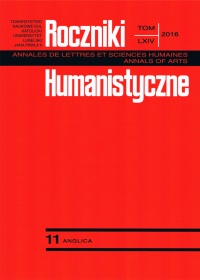Learning a foreign language through play
Abstrakt
Rola zabawy w uczeniu się języka obcego
Zabawa jest jedną z głównych form aktywności dziecka od niemowlęctwa do okresu dojrzewania, a prawo do uczestnictwa w zabawie jest uznawane za jedno z podstawowych praw dziecka. Naturalna skłonność dziecka do zabawy stwarza okazje do poznawania świata, nawiązywania więzi społecznych i stanowi główny motor jego rozwoju psychicznego i fizycznego. Artykuł porusza tematykę roli zabawy w procesie uczenia się i nauczania języka obcego na etapie przedszkolnym i wczesnoszkolnym. Celem artykułu jest wykazanie, że nauczanie poprzez zabawę stwarza rozwojowo uzasadniony kontekst do kształtowania kompetencji językowej dziecka w sposób spontaniczny, autonomiczny, zrozumiały i przyjemny. Zabawa zapewnia warunki, w których nauczyciel może jednocześnie zaspokajać potrzeby ruchowe, poznawcze, emocjonalne i społeczne małego dziecka i umożliwić mu oswojenie się ze środowiskiem klasy językowej. Gry i zabawy aktywizują wszystkie dzieci bez względu na różnice indywidualne i motywują je do uczestnictwa w lekcjach języka obcego. Artykuł rozpoczyna się wprowadzeniem definicji zabawy oraz omówieniem roli jaką odgrywa ona w rozwoju dziecka. Przedstawione są formy i zasady zastosowania gier i zabaw podczas lekcji języka obcego i korzyści językowe, poznawcze i społeczne płynące z nauczania poprzez zabawę. Autorka omawia również klasyfikację gier dla dzieci w wieku przedszkolnym i wczesnoszkolnym. W końcowej części artykułu zaprezentowane są praktyczne wskazówki dla nauczycieli języka obcego.
Bibliografia
Björklund, David F. 2012. Children’s thinking: Cognitive development and individual differences. Belmont: Wadsworth Cengage Learning.
Brewster, Jean, Gail Ellis, and Denis Girard. 1992. The primary English teacher’s guide. Harlow: Pearson Education.
Brewster, Jean, Gail Ellis, and Denis Girard. 2002. The primary English teacher’s guide. New edition. Edinburgh: Pearson Education.
Bruner, Jerome. 1972. “The nature and uses of immaturity.” American Psychologist 27: 687–708.
Cameron, Lynne. 2003. “Challenges from the expansion in teaching children.” ELT Journal 57, 2: 105–112.
Copland, Fiona, Sue Garton, and Monika Davis. 2012. Crazy animals and other activities for teaching English to young learners. London: British Council.
Christie, James. 2001. “Play as a learning medium.” In Theory in context and out, edited by Stuart Reifel, 358–365. Westport: Ablex
Christie, James, and Kathleen Roskos. 2007. “Play in an era of early childhood standards.” In Several perspectives on children’s play: Scientific reflections for practitioners, edited by Tom Jambor and Jan Van Gills, 133–145. Antwerp: Garant Publishers.
Elkind, David. 1981. “Child development and early childhood education: Where do we stand today?” Young Children 36, 5: 2–9.
Enever, Janet (ed.). 2011. ELLiE. Early Language Learning in Europe. London: The British Council.
Erikson, Erik H. 1963. Childhood and society. 2nd edition. New York: Norton.
Fromberg, Doris Pronin. 1997. “What’s new in play research?” Child Care Information Exchange 11/97: 53–55.
Fromberg, Doris Pronin. 1998. “Play issues in early childhood education.” In The early childhood curriculum: A review of current research, 2nd edition, edited by Carol Seefeldt, 190–212. Columbus: Merrill.
Fromberg, Doris Pronin. 2002. Play and meaning in early childhood education. Boston: Allyn and Bacon.
Gestwicki, Carol. 1999. Developmentally appropriate practice: Curriculum and development in early education. Albany: Delmar Publishers.
Gardner, Howard. 1993. Frames of mind: The theory of multiple intelligences, 10th anniversary edition. New York: Basic Books.
Garton, Sue, Fiona Copland, and Anne Burns. 2011. Investigating global practices in teaching English to young learners. ELT Research Papers 11-01. London: The British Council.
Haight, Wendy L., and Peggy J. Miller. 1993. Pretending at home. Early development in a sociocultural context. Albany, NY: Suny Press.
Isenberg, Joan Packer. 2002. “Play: essential for all children.” Childhood Education 79, 1: 33–39.
Khan, Julia. 1991. “Using games in teaching English to young learners.” In Teaching English to children, edited by Christopher Brumfit, Jayne Moon, and Ray Tongue, 142–156. Edinburgh: Longman.
Lewis, Gordon, and Günther Bedson. 1999. Games for children. Oxford: Oxford University Press.
Maley, Alan. 1999. Foreword to Games for children, by Gordon Lewis and Günther Bedson, 5–6. Oxford: Oxford University Press.
Maley, Alan. 2003. Introduction to Very Young Learners. 8th edition, by Vanessa Reilly and Sheila M. Ward, 2. Oxford: Oxford University Press.
Ortega, Lourdes. 2009. Understanding second language acquisition. New York, Routledge.
Pound, Linda. 2006. Supporting mathematical development in the early years, 2nd edition. Maidenhead: Open University Press.
Pound, Linda. 2009. How children learn 3: Contemporary thinking and theorists. London: Practical Pre-school Books.
Piaget, Jean (1945/1962). Play, dreams, and imitation in childhood. New York: Norton.
Piaget, Jean. 1970. Science of education and the psychology of the child, translated by D. Coltman. New York: Orion Press.
Pinter, Annamaria (2006). Teaching young language learners. Oxford: Oxford University Press.
Reilly, Vanessa, and Sheila Ward. 1997/2003. Very young learners. 8th edition. Oxford: Oxford University Press.
Rixon, Shelagh. 1981. How to use games in language teaching. London: Macmillan.
Rixon, Shelagh. 1991. “The role of fun and games activities in teaching young learners.” In Teaching English to children, edited by Christopher Brumfit, Jayne Moon, and Ray Tongue, 33–48. Edinburgh: Longman.
Robson, Sue. 2006. Developing thinking and understanding in young children. Abingdon and New York: Routledge.
Roth, Genevieve. 1998. Teaching very young children: Pre-school and early primary. London: Richmond.
Rumley, Glynis. 1999. “Games and songs for teaching modern foreign languages to young children.” In The Teaching of modern foreign languages in the primary school, edited by Patricia Driscoll and David Frost, 114–125. London: Routledge.
Szpotowicz, Magdalena, and Małgorzata Szulc-Kurpaska. 2009. Teaching English to young learners. Warszawa: Wydawnictwo Naukowe PWN.
Toth, Maria. 1995. Children’s games: A teacher’s resource book of games for young learners of English. Oxford: Macmillan Heinemann.
UN General Assembly. Convention on the Rights of the Child, 20 November 1989, United Nations, Treaty Series, vol. 1577, p. 3, Article 31 available at: http://www.refworld.org/ docid/3ae6b38f0.html (accessed 10 October 2015).
Vygotsky, Lev S. 1978. Mind in society. Cambridge: Harvard University Press.
Copyright (c) 2016 Roczniki Humanistyczne

Utwór dostępny jest na licencji Creative Commons Uznanie autorstwa – Użycie niekomercyjne – Bez utworów zależnych 4.0 Międzynarodowe.





